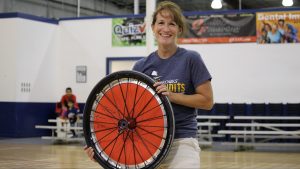World Music Therapy Day 2021

Back to physical health resource hub
Music therapy is an allied health profession that utilizes research-based music interventions to address nonmusical goals. Music therapy is used to address physical, cognitive, communicative, social and emotional needs of individuals of all ages and diagnoses. At Brooks Rehabilitation, our therapists provide services based on a neuroscientific model. The interventions applied can impact multiple regions of the brain and contribute to the creation of new connections in the brain. Specified use of music is used to cue and prime language, stimulate the motor system and improve cognition.
What are some of the functional outcomes?
Speech/Language
- Improved verbalizations & accuracy
- Improved speech rate & articulation
- Increased vocal volume
- Improved respiratory strength and coordination
Movement
- Improved fine and gross motor coordination
- Improved walking
- Improve strength, endurance and range of motion
- Improved ability to sequence multiple steps required for daily activities
Cognition
- Improved attention
- Improved orientation to self and environment
- Improved memory & reminiscence
- Improved visual scanning
- Improved executive functioning
- Improved initiation
Additionally, when using salient music specific to the client, music therapy can lead to improved activity tolerance, social engagement and quality of life. Music can also be used to decrease the frequency of agitated and aggressive behaviors, reduce depression and perception of pain/discomfort.
Interventions are goal-focused but our therapists put the “fun” in “functional”.
What does music therapy look like?
Here are a few examples:
- Clients may complete a specific movement, exercise or walk with live auditory cues provided on a guitar, keyboard or autoharp
- Clients may strike, tap or shake a percussion instrument with arms, legs, hands or feet
- Clients may sing an overlearned song facilitated by the therapist’s voice and guitar/keyboard
- Clients may play a harmonica or recorder
- Clients may learn a personalized orientation or safety song
- Clients may participate in group music making via singing or instrument play
Quick facts
- Services are provided system-wide and growing!
- We cotreat with other disciplines including physical, occupational and speech therapists.
- At the inpatient hospital, we use a systematic process comprised of an assessment, creation of objective goals, daily treatment notes, a discharge survey and discharge recommendations.
- We have a nationally recognized internship program for music therapy students.
- Our music therapists are involved in research at Brooks.
- No music experience or training is required to benefit from music therapy.
Check out our podcast about Music Therapy!
Learn More About Music Therapy


